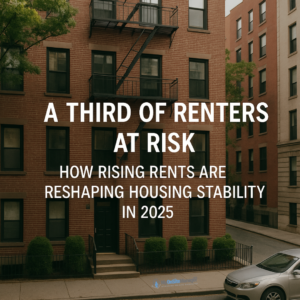A new report reveals a staggering reality: one in three renters say they’d be forced to move if their rent increased by just the average amount seen across the UK. With rents continuing to climb in the wake of inflation, migration pressures, and housing shortages, housing instability is fast becoming the norm rather than the exception. What does this mean for everyday renters and what can be done?
The Key Stat: 34% Would Be Forced to Move
According to a survey conducted by the Joseph Rowntree Foundation (JRF) and the campaign group Generation Rent, 34% of renters said they would be unable to afford a £110 monthly rent increase, the current national average.
This increase might not seem extreme on paper, but for millions of households already spending more than 30% of their income on rent, any further jump pushes them to the brink.
Source: Yahoo News – A third of renters could be ‘forced out’ by average rent rise
What’s Driving the Rent Surge?
-
Record Migration & Population Growth
High population inflows without proportional housing supply have squeezed urban markets. More demand + limited housing = rising rents. -
Stagnant Wages vs Rising Costs
Renters’ incomes haven’t kept pace with housing costs. While landlords adjust rent for inflation, renters face stagnant wage growth and growing bills. -
Lack of Affordable Housing
Public housing and affordable rental construction haven’t kept up. This supply-demand imbalance puts tenants at the mercy of market pricing. -
Short-Term Let Conversions
More properties are being shifted into short-term rentals (like Airbnb), reducing the stock of long-term rentals and pushing rents even higher.
A National Displacement Crisis?
Let’s talk consequences. If over a third of renters are at risk of being forced to move, this could lead to:
-
A rise in evictions (especially “no-fault” or end-of-term evictions).
-
Greater housing insecurity for vulnerable populations, including students, low-income workers, and families.
-
Disrupted schooling and work for families forced to relocate.
-
Overburdened shelter systems and legal aid organizations.
-
Rising mental health struggles from instability and relocation stress.
It’s Not Just the UK: A Global Pattern
This problem isn’t isolated. Countries around the world are seeing similar trends:
🇺🇸 United States: Cities like New York and Los Angeles are witnessing historic rent highs. Tenants in “rent-controlled” buildings are still reporting 3–5% increases annually, with limited protections in place for renewals.
🇦🇺 Australia: Reports show older renters are now moving into shared homes or even caravans due to rent pressure. Some seniors endure 3-hour commutes just to afford a roof over their heads.
🇩🇪 Germany: Berlin passed rent freeze laws but saw landlords respond by converting units into luxury properties or pulling them off the market.
What Can Be Done?
| Who | Possible Action |
|---|---|
| Renters |
|
| Landlords |
|
| Policymakers |
|
| Community Leaders & Nonprofits |
|
A Personal Story Behind the Data
One survey respondent shared that a £100 rent increase left them choosing between rent and groceries. Another noted they’d already moved three times in two years due to rising costs, and they’re “exhausted” from the instability.
Behind every stat is a real family, individual, or elderly renter trying to stay afloat.
Where Do We Go From Here?
The fact that 1 in 3 renters is at risk of being priced out of their homes is a wake-up call. It reflects not just a housing affordability issue, but a social justice and economic stability crisis in the making.
Rent shouldn’t feel like a gamble and tenants shouldn’t have to fear a simple renewal notice. Addressing this issue will take serious policy reform, community action, and a reimagining of how we define “home” in the modern economy.

